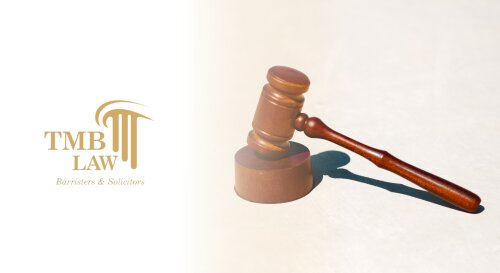Best Lawsuits & Disputes Lawyers in Oshawa
Share your needs with us, get contacted by law firms.
Free. Takes 2 min.
List of the best lawyers in Oshawa, Canada
Canada Lawsuits & Disputes Legal Articles
Browse our 1 legal article about Lawsuits & Disputes in Canada written by expert lawyers.
- Small Claims Court in Ontario Canada - Guide & Process FAQ
- The financial limit for filing a lawsuit in Ontario Small Claims Court is $35,000 CAD, excluding interest and court costs. Plaintiffs generally have exactly two years from the date the dispute arose to file their claim under the Ontario Limitations Act. Winning a judgment does not mean the court will... Read more →
About Lawsuits & Disputes Law in Oshawa, Canada
Lawsuits & Disputes law in Oshawa, Canada, encompasses a wide range of legal conflicts that may arise between individuals, businesses, or other entities. This area of law deals with resolving disagreements through legal procedures such as negotiation, mediation, arbitration, or court litigation. Whether it is a contract dispute, property issue, personal injury claim, or any other type of legal conflict, the goal is to reach a fair resolution in accordance with the law. In Oshawa, local courts and legal professionals work within the framework of Ontario's legal system to handle these cases effectively.
Why You May Need a Lawyer
There are several situations where you might require the help of a lawyer for Lawsuits & Disputes in Oshawa, Canada. Common scenarios include:
- Contract Disputes: When the terms of a contract are breached or misinterpreted, leading to a conflict between the parties involved.
- Property Disputes: Conflicts over property boundaries, ownership, or tenancy issues.
- Personal Injury Claims: When you suffer an injury due to someone else's negligence and need to seek compensation.
- Employment Disputes: Issues such as wrongful termination, harassment, or unpaid wages.
- Family Disputes: Legal conflicts arising from divorce, child custody, or inheritance issues.
- Business Disputes: Disagreements between business partners or disputes arising from commercial transactions.
Having a lawyer can help navigate these complex situations, ensure your rights are protected, and work towards a fair resolution.
Local Laws Overview
Oshawa, located in the province of Ontario, follows Ontario's legislative framework for handling lawsuits and disputes. Key aspects of the local laws relevant to this field include:
- Ontario Civil Courts: The Superior Court of Justice and the Small Claims Court handle civil disputes, with the latter dealing with claims up to $35,000.
- Statutes of Limitations: Ontario's Limitations Act sets deadlines for filing various types of lawsuits, typically two years from the date the claim is discovered.
- Alternative Dispute Resolution (ADR): Encouraged by the courts, ADR methods such as mediation and arbitration can provide faster and less adversarial solutions.
- Rules of Civil Procedure: Govern the conduct of civil litigation in Ontario's courts, providing guidelines for everything from filing a lawsuit to conducting a trial.
Understanding these local laws is crucial for anyone involved in a legal dispute in Oshawa.
Frequently Asked Questions
What is the first step in filing a lawsuit?
The first step in filing a lawsuit is to consult with a lawyer to evaluate the merits of your case and determine the appropriate court. Your lawyer will then draft and file a Statement of Claim.
How long does a civil lawsuit take to resolve?
The duration of a civil lawsuit can vary widely, from a few months to several years, depending on the complexity of the case, the court's schedule, and the willingness of the parties to settle.
What is mediation, and how does it work?
Mediation is a form of Alternative Dispute Resolution (ADR) where a neutral third party, the mediator, helps the disputing parties reach a mutually acceptable agreement. It is less formal than court and can be quicker and less costly.
Can I represent myself in court?
Yes, you can represent yourself in court, but it is generally not advisable unless the case is very straightforward. Legal procedures and court rules can be complex, and a lawyer can help ensure your case is presented effectively.
What are the costs associated with filing a lawsuit?
The costs can include court filing fees, legal fees, and other expenses such as expert witness fees and document production costs. Your lawyer can provide a detailed estimate based on your specific case.
What is a summary judgment?
A summary judgment is a legal motion requesting the court to decide the case or a particular issue within the case without a full trial, typically because there are no material facts in dispute requiring a trial to resolve.
How are small claims cases different from other lawsuits?
Small claims cases are simpler, less formal, and typically faster than other lawsuits, with a monetary limit of $35,000 in Ontario. They are designed for individuals to resolve minor disputes without the need for extensive legal representation.
What happens if I lose a lawsuit?
If you lose a lawsuit, you may be ordered to pay the other party's legal costs in addition to your own. If you disagree with the judgment, you might have the option to appeal the decision to a higher court.
Can legal disputes be settled out of court?
Yes, many legal disputes are settled out of court through negotiation or ADR methods like mediation and arbitration, which can save time and legal costs.
What should I bring to my initial consultation with a lawyer?
Bring all relevant documents related to your case, such as contracts, correspondence, and any evidence supporting your claim. Be prepared to discuss the details of your dispute clearly and accurately.
Additional Resources
Here are some resources and organizations that can be helpful for those seeking legal advice on Lawsuits & Disputes in Oshawa, Canada:
- Ontario Ministry of the Attorney General: Provides information on court services, legal aid, and dispute resolution programs.
- Legal Aid Ontario: Offers legal services for those who qualify based on financial need.
- Durham Community Legal Clinic: Provides free legal services and advice to low-income residents of Oshawa and Durham Region.
- Ontario Bar Association: Offers resources to help find a lawyer and understand your legal rights.
Next Steps
If you need legal assistance with a lawsuit or dispute in Oshawa, follow these steps:
- Identify Your Issue: Clearly define the nature of your legal dispute and gather all relevant documents.
- Research and Choose a Lawyer: Use resources like the Ontario Bar Association to find a qualified lawyer with experience in the relevant area of law.
- Schedule a Consultation: Contact the lawyer to set up a meeting and discuss your case. Ask about their experience, approach, and fees.
- Prepare for the Consultation: Bring all necessary documents and be ready to explain your issue in detail.
- Follow Legal Advice: Based on the lawyer's advice, proceed with the necessary legal actions, whether it's filing a lawsuit, negotiating a settlement, or exploring ADR options.
Taking these steps can help you navigate the legal system more effectively and work towards a resolution to your dispute.
Lawzana helps you find the best lawyers and law firms in Oshawa through a curated and pre-screened list of qualified legal professionals. Our platform offers rankings and detailed profiles of attorneys and law firms, allowing you to compare based on practice areas, including Lawsuits & Disputes, experience, and client feedback.
Each profile includes a description of the firm's areas of practice, client reviews, team members and partners, year of establishment, spoken languages, office locations, contact information, social media presence, and any published articles or resources. Most firms on our platform speak English and are experienced in both local and international legal matters.
Get a quote from top-rated law firms in Oshawa, Canada — quickly, securely, and without unnecessary hassle.
Disclaimer:
The information provided on this page is for general informational purposes only and does not constitute legal advice. While we strive to ensure the accuracy and relevance of the content, legal information may change over time, and interpretations of the law can vary. You should always consult with a qualified legal professional for advice specific to your situation.
We disclaim all liability for actions taken or not taken based on the content of this page. If you believe any information is incorrect or outdated, please contact us, and we will review and update it where appropriate.
Browse lawsuits & disputes law firms by service in Oshawa, Canada
Oshawa, Canada Attorneys in related practice areas.













